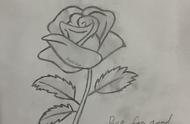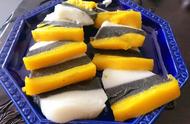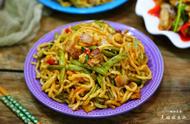本课重点学习内容是:
1、形容词、副词的比较级和最高级。
2、一般现在时的用法,两项内容。
Joe Sanders has the most beaytiful garden in our town.
1、形容词、副词的比较级和最高级
形容词/副词的比较级和最高级的构成规则
(1)单音节词和少数以-er,-ow结尾的双音节单词,比较级在后面加-er,最高级在后面加-est。
① 单音节单词:small→smaller→smallest
short→shorter→shortest
tall→taller→tallest
great→greater→greatest
② 少数以-er,-ow结尾的双音节单词:
clever→cleverer→cleverest
narrow→narrower→narrowest
(2)以不发音e结尾的单音节单词,比较级在原形后加-r,最高级在原级后加-st。
large→larger→largest \
nice→nicer→nicest
able→abler→ablest
(3)以一个辅音字母结尾的闭音节(即:辅音+元音+辅音)单词中,先双写末尾的辅音字母,比较级加-er,最高级加-est。
big→bigger→biggest hot→hotter→hottest fat→fatter→fattest
4)以“辅音字母+y”结尾的双音节词, 把y改为i,比较级加-er,最高级加-est。
easy→easier→easiest heavy→heavier→heaviest
busy→busier→busiest happy→happier→happiest
(5)其他双音节词和多音节词,比较级在前面加more,最高级在前面加most。
beautiful→more beautiful→most beautiful
different→more different→most different
easily→more easily→most easily
(6)有少数形容词、副词的比较级和最高级是不规则的,必须熟记。
good→better→best
well→better→best
bad→worse→worst
ill→worse→worst
old→older/elder→oldest/eldest
many/much→more→most little→less→least
far →further/farther→ furthest/farthest
形容词和副词比较级的用法(1)“甲 be (倍数) 形容词比较级 than 乙”表示“甲比乙…”或“甲比乙…几倍”。
Tom is taller than Kate.汤姆比凯特高。
This room is three times bigger than that>这个房间比那个大三倍。
(2)“甲 实意动词 (倍数) 副词比较级 than 乙”表示“甲比乙…”或“甲比乙…几倍”。
I got up earlier than my mother this morning.我今天早晨起床比我妈妈还早。
He runs three times faster than his brother.他跑的速度比他弟弟快三倍。
3. 形容词和副词最高级的用法
(1)“主语 be the 形容词最高级( 单数名词) in/of...”表示“……是……中最……的”。
Tom is the tallest in his class./of all the students.汤姆是他们班上/所有学生当中最高的。
This apple is the biggest of the five. 这个苹果是五个当中最大的。
(2)“主语 实意动词 (the) 副词最高级 in/of...”表示“……是……中最……的”。
I jump (the) farthest in my class.我是我们班跳得最远的。
Nearly everybody enter forThe Nicest Garden Competiton each year.(一般现在时)
But Joe wins every time.(一般现在时)
一般现在时的用法
1、概念:表示经常性、习惯性、规律性、真理性的动作或状态,或者动作有时间规律发生的事件。在时间、条件等状语从句中,用现在时表示将来;在某些以here,there开头的句子中,用一般现在时表示正在发生的动作时间状语:often 经常,usually通常,always 总是,every每个,sometimes 有时,at …在几点钟
2、用法:分为两种结构:有be动词的和有行为动词的。
有Be动词的:肯定句: 主语 be 其他
否定句: 主语 be not 其他
一般疑问句: be 主语 其他? 回答:yes, 主语 be. / No, 主语 be not.
有实义动词的:
当主语是第三人称单数时:
1、动词变相应的第三人称单数形式
2、肯定句:主语 动词s 其它
3、否定句:主语 doesn't 动词原形 其它
4、一般疑问:句Does 主语 动词原形 其它
5、肯定回答 Yes,主语 does
6、否定回答 No,主语 doesn't
7、特殊疑问句特:殊疑问词 一般疑问句
当主语不是第三人称单数时:
1、肯定句: 主语 动词原形 其它
2、否定句: 主语 don't 动词原形 其它
3、一般疑问句: Do 主语 动词原形 其它
一般现在时第三人称单数谓语动词变化规则:
(1)直接在动词词尾加-s.;清辅音后读/s/ 浊辅音和元音后读/z/
(2)以辅音字母 o结尾的词 加 -es, 读/z/
(3)以字母s, x, ch, sh或o结尾的动词,在词尾直接加-es;.读/iz/
(4)以“辅音字母加 - y”结尾的动词,要先变y为i再加-es.
不规则变化:have和be动词 变have 为 has变be为am,is,are。
Bill Frith's garder is larger than Joe's.
Bill works harder than Joe and more flower and vegetable.but Joe's garden is more interesting.
He has made neat paths and has built a wooden bridge over a pool.
I like garden too.but I do not like hard work.
Every year I enter for the garden competition too.and I always win a little prize for zhe worst garden in zhe town!
















